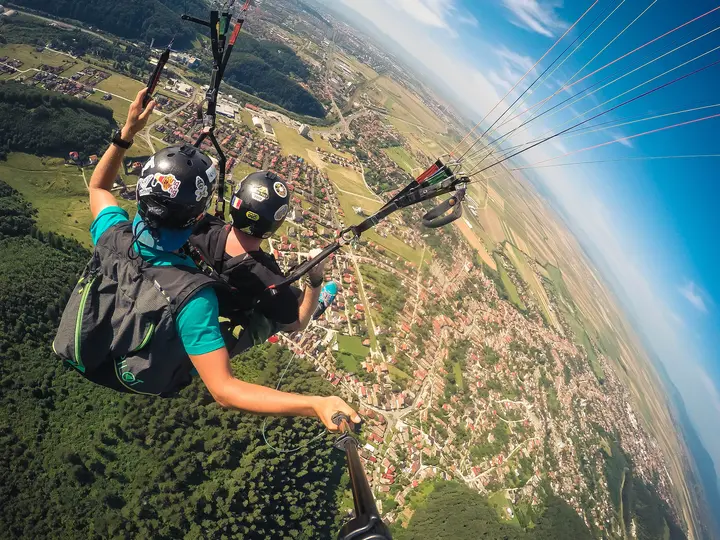Attraction: Does danger cause people to fall in love?

What if you could make someone fall in love with you, but you have to risk your life to do so?
Show key points
- Dr. Glenn Singleman and Heather Swan strengthen their romantic bond through shared experiences in extreme sports, which regularly expose them to life-threatening situations.
- Scientific research suggests that adrenaline-inducing activities can simulate the emotional state of falling in love by releasing chemicals like endorphins in the brain.
- The couple balances successful professional careers with their passion for high-risk adventures such as BASE jumping, SCUBA diving, and mountaineering.
- ADVERTISEMENT
- Glenn's fascination with fear began during a near-death kayaking experience, inspiring him to pursue challenges that push personal limits.
- Heather initially joined Glenn in his extreme pursuits out of curiosity, and eventually found that facing danger together helped solidify their emotional connection.
- Studies like the 1970 suspension bridge experiment show that high-adrenaline environments can increase perceived attraction between people.
- While adrenaline can amplify attraction, psychologists warn that these feelings may be misleading and advise making romantic decisions when emotions are stable.
Both Dr. Glenn Singleman and his wife Heather Swan have a love for extreme sports, and science tells us that the bond between them becomes stronger every time they avoid death.
Beyond the magic elixir or spell, the secret is to stimulate chemicals in your brain that are most released when faced with a dangerous situation, or during exercise. The feeling of falling in love is similar to that associated with high adrenaline.
Southern Highlands resident doctor Glenn Singleman and his wife face dangerous situations throughout.
They pursue successful careers in medicine and business administration from their base in Douglas Park, but they also have a passion for skydiving, base jumping (stationary skydiving to base-to-ground), SCUBA diving (diving with independent respirator on the surface) and mountaineering.
Recommend
During each death-defying act, endorphins, the hormone of happiness, are injected into their bodies as they cross the boundaries of their sport.
"My fascination with fear began when I first went kayaking in the Blue Mountains and thought I was going to die," the doctor said. "I found that the experience of facing and overcoming my fears that day energized me and gave me energy, and I became fascinated by fear." "That's when I wondered what other fears I had that were limiting the possibilities in my life," he says.

After developing his love for extreme sports, Glenn met business manager Heather Swan, who realized that a relationship with Glenn would inevitably mean participating in the sport as well. Not surprisingly, they were related, as they faced stressful and frightening situations together, which stimulated the attraction between them and reinforced this passion.
From the perspective of evolutionary biology, a male who is able to demonstrate his ability to withstand stress and danger appears to be a more suitable and protective partner.
The duo now hold three world records, including the world's highest BASE jump in a winged suit from a height of 6,604 meters from Mount Meru in the Indian Himalayas.
"I needed to explore the things Glenn did instead of ignoring them being crazy behaviors, which is really weird," Heather said.

But you don't have to jump into the sky to feel the effects of an adrenaline release – it can be as simple as a personal training session in the park – but knowing what adrenaline does to our emotional state makes it with interesting side effects, as you may suddenly fall in love with your fitness partner.
Gina Trigarthen, a clinical psychologist, says it's easy to fool our brains into creating a false sense of attraction: "While you may think you know when you're attracted to someone and feel excited, you're probably mistaken for attributing these signals to something that comes from other things in your environment."
"Intense exercise leads to stress, speeds up the heartbeat, and it's similar to the symptoms you get when your heart beats because you've found someone you're attracted to.

The most enjoyable study of all was the bridge study conducted by Dutton and Aaron in 1970, in which one attractive facilitator encourages a group of men to cross a dangerous suspension bridge, while another group is asked to cross a lowerer, safer bridge. The beautiful girl then gives all participants her phone number to "collect responses".
Half of the suspension bridge participants called her to ask her to go out on time, compared to just 12% of those on the safest bridge.
"The psychological advice is to make romantic decisions when your mind is balanced, not when there are other signals in your environment that might confuse you," Gina said.
Before you take your potential lover on a roller coaster ride in hopes of falling in love with you, be aware that it can backfire.
Just as adrenaline can boost feelings of attraction in a relationship, it can also have the opposite effect if you're not well placed to start a relationship.
"If someone finds someone unattractive, they're more likely to find them more unattractive after an exciting event like this, so you might take someone to a horror movie and they'll find you really horrible afterwards," says Gina.
"Personal trainers and other sports teachers will be aware of this, so we find that most of those in the industry adhere to a policy of not dating clients and clients.
What is the message and significance of all this?
In order to start your current relationship, try an appropriately exciting activity.








